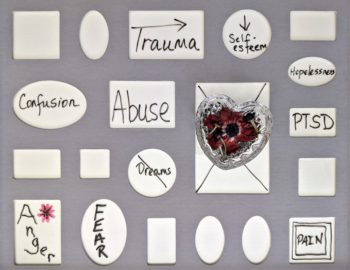What exactly is PTSD? What causes it? Who suffers from it? And can it be treated effectively? This week, let’s take a close look at what causes PTSD, why and how it affects sufferers, and how they can find the supports and treatment they need to move beyond their trauma.
There are a lot of myths and misunderstandings around Post-Traumatic Stress Disorder and those who suffer from its potentially devastating effects. Many of these misunderstandings are due to sensationalized characterizations of the condition in movies and television, with people suffering from PTSD depicted as dangerous, unstable, and incurable. As with many mental health conditions, the myths around PTSD can be extremely harmful and hurtful for those who suffer from this condition.
Experiencing or witnessing life-threatening trauma
What typically comes to mind when most of us think about PTSD, is a member of the military, back home after a tour of active duty, haunted by their wartime experiences. But virtually anyone could suffer from PTSD. Any one of us, at any time, could suffer or witness first-hand a life-threatening trauma. And it is in the aftermath of experiencing or witnessing a life-threatening trauma that PTSD can take root.
PTSD initiates with a traumatic experience or exposure to actual or threatened sudden death, serious injury, or violent assault, sexual violence, or the serious injury or sudden, unexpected death of a loved one. This involves witnessing or experiencing a traumatic, life-threatening event. Traumatic, life-threatening situations include natural disasters, serious industrial, home, recreational, or transportation (plane, car, or other vehicles) accidents, physical or sexual assault, and combat or war zone exposure. It is also possible to experience PTSD upon learning that an accidental or intentional traumatic event has happened to a close friend or family member. Further, individuals, such as first responders and police officers who are exposed over and over again to traumatic events in their work can suffer from PTSD.

After The Trauma
It is perfectly normal and natural to feel frightened and traumatized by a life-threatening event. In the first few months following the experience of a traumatic event, people move through a whole range of emotions and symptoms, vividly replaying and reliving the event, possibly feeling a great deal of unease and fear. But eventually, most people recover from these symptoms and move on from their trauma. For those who suffer from PTSD, these symptoms persist beyond a few months. For some, PTSD symptoms can show up later, even years after a traumatic event.
Troubling, Prolonged Symptoms
People who suffer from PTSD can experience any number of disturbing and distressing symptoms that prevent them from living a full and enjoyable life. They may be plagued with intrusive and upsetting memories and/or dreams of the traumatic event. They may experience flashbacks, and in some instances temporarily lose touch with the present and feel that they are in life-threatening danger. They may suffer momentary or prolonged distress when exposed to a trigger — that is to say a reminder — of their trauma. Triggers might include anything, from a sound, an odor, a sight, anything that reminds them of some element of their traumatic event. These triggers might also set off distressing psychological reactions.
Memories, Thoughts, Feelings, And Actions
People who suffer from PTSD might also avoid triggers and suppress memories, thoughts, and feelings of their trauma. They may suffer from associative amnesia, an inability to remember some parts of their traumatic event. They may harbor strong negative self-beliefs, and feel that they are weak or too damaged to recover. They may be hypervigilant, easily startled, and distrust others. They may feel unsafe in the world. They may have difficulty concentrating, sleeping They may blame themselves for their trauma. They may experience persistent and overpowering anger, fear, shame, or guilt, or may engage in negative interactions involving verbal or physical aggression. They may feel isolated and detached from other people, and unable to enjoy life. They may engage in risky behaviors.
These symptoms can emerge over time, and persist and increase if left untreated. The good news is that there are effective treatments available for those suffering from PTSD.

Effective Treatments
Effective treatments for PTSD include Cognitive Behavioral Therapy (CBT), Prolonged Exposure Therapy (PET), and Stress Inoculation Training (SIT). A particularly effective form of therapy for sufferers of PTSD is Eye Movement Desensitization and Reprocessing (EMDR). This interactive form of therapy is proven to greatly relieve, reduce or remove psychological stress. In some cases, medications can help alleviate or manage troubling symptoms.
No Time Like The Present
As with any mental health condition, replacing stigma, myths, and ignorance with knowledge, compassion and the ability to recognize symptoms are the first steps to finding help. There are highly effective treatments available, and if you, or someone close to you, suffers from PTSD, there is no time like the present to begin to heal and create a healthier, happier future. Talk to a trusted friend or family member, seek the help of a primary care physician, or talk to your EAP insurance provider, or connect with one of the resources in the list at the end of this article.

Dr. Monica Vermani’s tips on seeking treatment for PTSD
Understanding the causes and recognizing the symptoms of PTSD are the first steps to healing. If you believe that you or someone you know suffers from PTSD, there are resources, help and effective treatments available. You can:
- Confide in a trusted friend or family member who can support and help you connect with the resources you need
- Talk to your doctor or a primary care physician
- Seek help from your insurance provider if you are an employee with an EAP
For PTSD help please contact:
USA
Substance Abuse and Mental Health Services Administration (SAMHSA) National Helpline: 1-800-662-HELP (4357)
UK
Canada
Canadian Mental Health Association 416-646-5557
Canadian Psychological Association
1-888-472-0657
Mental Health Commission
613-683-3755
eMental Health
Government of Canada
Canadian Association for Suicide Prevention
204-784-4073
Canada Drug Rehab Addiction Services Directory
1-866-462-6362
Centre for Suicide Prevention
1-833-456-4566
Crisis Services Canada
1-833-456-4566, or text 45645
First Nations and Inuit Hope for Wellness Help Line
1‑855‑242-3310
Kids Help Phone
1-800-668-6868
National Eating Disorder Information Centre
1-866-633-4220
Native Youth Crisis Hotline
1-877-209-1266
Main Image Photo Credit: www.unsplash.com
Dr. Monica Vermani
Author
Dr. Monica Vermani is a Clinical Psychologist who specializes in treating trauma, stress, mood & anxiety disorders and is the founder of Start Living Corporate Wellness. Her book, A Deeper Wellness, is coming out in 2021. www.drmonicavermani.com














































































































